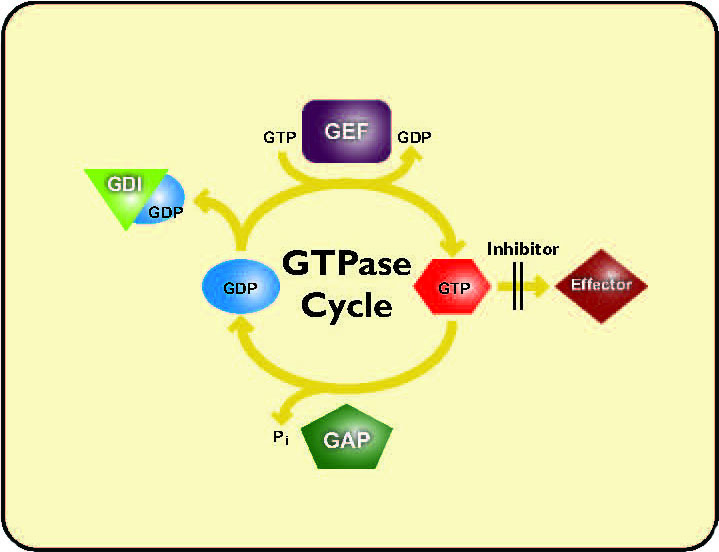Small GTPases
HTS assays for small G-proteins
The activity and regulation of small G-proteins has been shown to play an important role in the development and progression of a number of diseases such as cancer, cardiovascular disorders, inflammation, and neurological disorders. Targeting G-proteins, their regulators, and their downstream effectors is therefore becoming an important area of drug discovery. See the main G-protein page for general information about these proteins. Cytoskeleton, Inc. provides HTS format assays to measure in vivo activities of small G-proteins as well as in vitro drug discovery HTS assays for GEFs, GAPs, and G-protein - effector interactions.
Click on the assays listed below for more information.

Cytoskeleton's small G-protein products have been cited hundreds of times over the past two decades (see individual product page for a list of citations). Due to the sensitive nature of drug screening efforts not many of these publications are directly related to drug discovery. However, there are a few that are described below:
Surviladze et al., 2010. Identification of a small GTPase inhibitor using a high-throughput flow cytometry bead-based multiplex assay. J. Biomol. Screen. 15, 10-20.
Question 1: I need a particular small G-protein/GEF combination for an assay, but I don't see it in Cytoskeleton’s list of products - can you provide those?
Answer 1: Yes, in most cases, Cytoskeleton, Inc. is able to accommodate custom protein purification needs, including fulfilling requests for specific G-protein/GEF combinations. The only requirement is that an assay needs to be available for us to measure GDP/GTP exchange to confirm that the proteins are functional. For the functional assay, we use mant-GTP in a fluorophore-based GEF assay (Cat. # BK100). If the GTPase/GEF proteins are compatible with mant-GTP, then there should be no issues.
Question 2: Which is the best assay format to develop inhibitors of small G-proteins?
Answer 2: The best assay format for developing and screening G-protein inhibitors is Cytoskeleton’s G-LISA activation assays (Cat. # BK124, BK125, BK127, BK128, BK129). These assays use a 96 well plate format which allows anywhere from 2-96 reactions (wells) to be run at one time. The G-LISAs use very little material per reaction (10-50 μg protein from a 3 cm plate), take less than 3 hours and provide quantitative data. These features make G-LISAs ideal for developing inhibitors, testing different concentrations of an inhibitor, or performing inhibitor time-course experiments. To study GEF and GAP inhibitors or characterize potential GEFs and GAPs, we offer the RhoGEF Exchange Assay Biochem Kit (Cat. # BK100) and the RhoGAP Assay Biochem Kit (Cat. # BK105).
For more information, click on the Documents tab above to see the datasheet, or contact Technical Support at tservice@cytoskeleton.com.
- Arf1 G-LISA Activation Assay Kit (Colorimetric Based) - 96 assays BK132Learn More
G-LISA Arf1 Activation Assay Biochem Kit (Colorimetric Based)
-
-
-
- Cdc42 G-LISA Activation Assay (Colorimetric format) - 96 assays BK127Learn More
G-LISA Cdc42 Activation Assay Biochem Kit (Colorimetric format)
-
- Rac1 G-LISA Activation Assay Kit (Colorimetric Based) 96 assays BK128Learn MoreRac1 G-LISA Activation Assay (Colorimetric Based)
- Rac1,2,3 G-LISA Activation Assay (Colorimetric format) 96 assays BK125Learn MoreG-LISA Rac 1,2,3 Activation Assay Biochem Kit (colorimetric format)
- RalA G-LISA Activation Assay Kit (Colorimetric Based) 96 assays BK129Learn MoreRalA G-LISA Activation Assay (Colorimetric Based)
- Ras G-LISA Activation Assay Kit (Colorimetric Based) - 96 assays BK131G-LISA Ras Activation Assay Biochem Kit (Colorimetric format) Learn More
- RhoA G-LISA Activation Assay Kit (Colorimetric format) 96 assays BK124Learn MoreG-LISA RhoA Activation Assay Biochem Kit (colorimetric format)
-
-
- Signal-Seeker™ Acetyl-Lysine Detection Kit (10 assay) BK163-SSignal Seeker Acetylation Detection Kit (10 assays, immunoprecipitation format) Learn More
- Signal-Seeker™ Acetyl-Lysine Detection Kit (30 assay) BK163Signal Seeker Acetylation Detection Kit (30 assays, immunoprecipitation format) Learn More
- Signal-Seeker™ Phosphotyrosine Detection Kit (10 assay) BK160-SSignal Seeker Phosphotyrosine Detection Kit (10 assays, immunoprecipitation format) Learn More
- Signal-Seeker™ Phosphotyrosine Detection Kit (30 assay) BK160Learn MoreSignal Seeker Phosphotyrosine Detection Kit (30 assays, immunoprecipitation format)
- Signal-Seeker™ SUMOylation 1 Detection Kit (10 assay) BK165-SSignal Seeker SUMOylation 1 Detection Kit (10 assays, immunoprecipitation format) Learn More
- Signal-Seeker™ SUMOylation 1 Detection Kit (30 assay) BK165Signal Seeker SUMOylation 1 Detection Kit (30 assays, immunoprecipitation format) Learn More
- Signal-Seeker™ SUMOylation 2/3 Detection Kit (10 assay) BK162-SSignal Seeker SUMOylation 2/3 Detection Kit (10 assays, immunoprecipitation format) Learn More
- Signal-Seeker™ SUMOylation 2/3 Detection Kit (30 assay) BK162Signal Seeker SUMOylation 2/3 Detection Kit (30 assays, immunoprecipitation format) Learn More
- Signal-Seeker™ Ubiquitination Detection Kit (10 assay) BK161-SSignal-Seeker Ubquitination Detection Kit (10 assays, immunoprecipitation format) Learn More
- Signal-Seeker™ Ubiquitination Detection Kit (30 assay) BK161Signal-Seeker Ubquitination Detection Kit (30 assays, immunoprecipitation format) Learn More
-
-
-
